Holyrood 2016: MSPs return to Holyrood
- Published
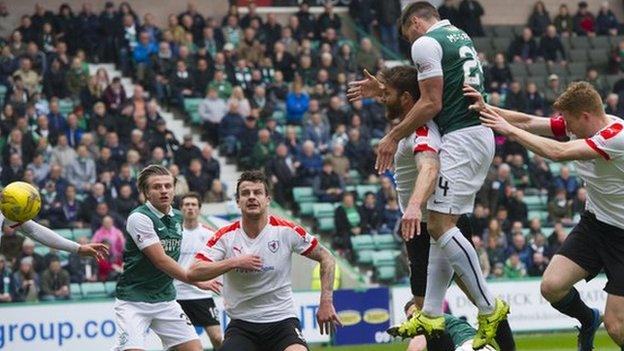
The cheers for Hibernian's goals against Raith Rovers echoed across Leith on Saturday
I chanced to be in a supermarket in the eastern sector of Edinburgh on Saturday. To narrow the topography still further, I heard, as I entered, a raucous cheer from the nearby stadium of Hibernian Football Club.
The yell no doubt greeted one of the two goals which Hibs scored that day to defeat their rivals, Raith Rovers, in the Championship play-off. I'm afraid I cannot offer more detail.
My interest in football has, perhaps understandably, waned - except that the Hibs result liberates the once and future champions to deprive Raith of their manager.
Inside the supermarket, I noted that there was a charitable appeal. Sundry buckets were scattered around pleading for cash to help the Gorgie City Farm.
Two thoughts instantly occurred. One, it takes a certain courage to solicit cash in the environs of Easter Road for a charity which abuts Tynecastle. I hope they did well.
Two, it reminded me of the undoubted highlight of the election campaign which involved Willie Rennie at said Gorgie Farm in the company of frisky pigs. Happy, incomprehensible days.
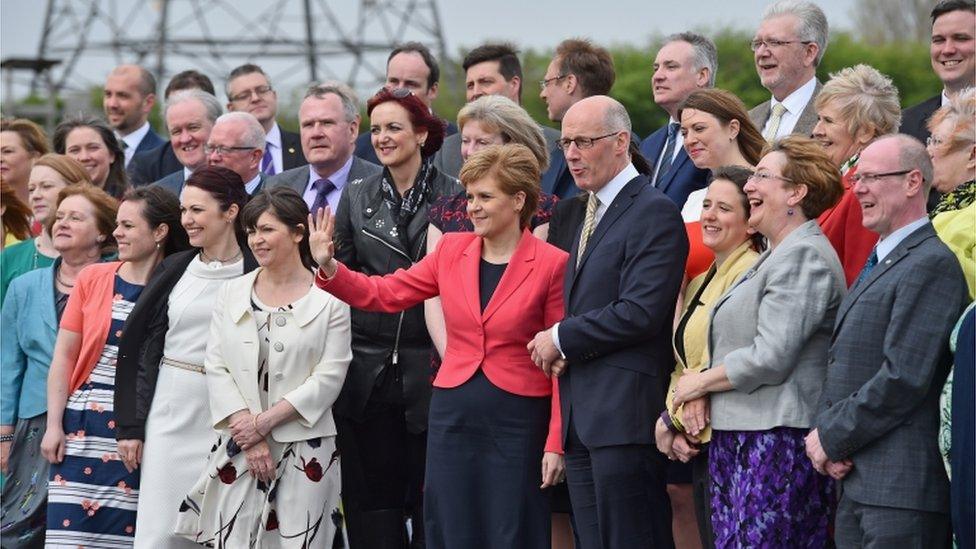
The SNP has many more MSPs this time than when it formed a minority government in 2007
That campaign over, it was back to work for our elected tribunes today. The old hands - like Mr Rennie - exuding confidence and familiarity. The new boys and girls anxiously finding their way around, constantly fearful that some brute is about to pinch their tuck.
It is, in truth, an elegant, genteel return. Thursday before we get a new presiding officer. Maybe Elaine Smith? Johann Lamont? Ken Macintosh? John Scott? Murdo Fraser? The retiring incumbent, Tricia Marwick, was on hand today, tendering helpful advice.
As things stand, the middle of next week before Nicola Sturgeon is confirmed as parliament's nominee to the Queen for first minister. To be clear, Ms Sturgeon can carry on governing for now with the previous mandate, Her Majesty being understandably disinclined to countenance a vacuum in Scottish governance.
Despite the cheery chat today, there is some offstage growling already under way anent the power structure in parliament.
Balance of power
For example, the Greens, understandably buoyed by their advance, are prone to say that they now hold the balance of power. Up to a point, Lord Copper. They no more hold the balance than do Labour, the Liberal Democrats, the Tories - or indeed any couple of rebellious MSPs within said parties.
That is because the SNP has 63 seats this time around, not the 47 they gained in 2007, which was then just one more than Labour and nowhere near a majority.
In 2007, there were prolonged negotiations between the SNP and the Greens in pursuit of a "supply and confidence" pact. (One insider told me today they suspected some members of the Green delegation strung the talks out because the grub commissioned by civil servants was notably good and plentiful. I'm sure this was a joke.)
Anyway, the pact which duly emerged foundered the instant the Greens failed to vote with the SNP over a budget. It was seldom mentioned again. And certainly never deployed.
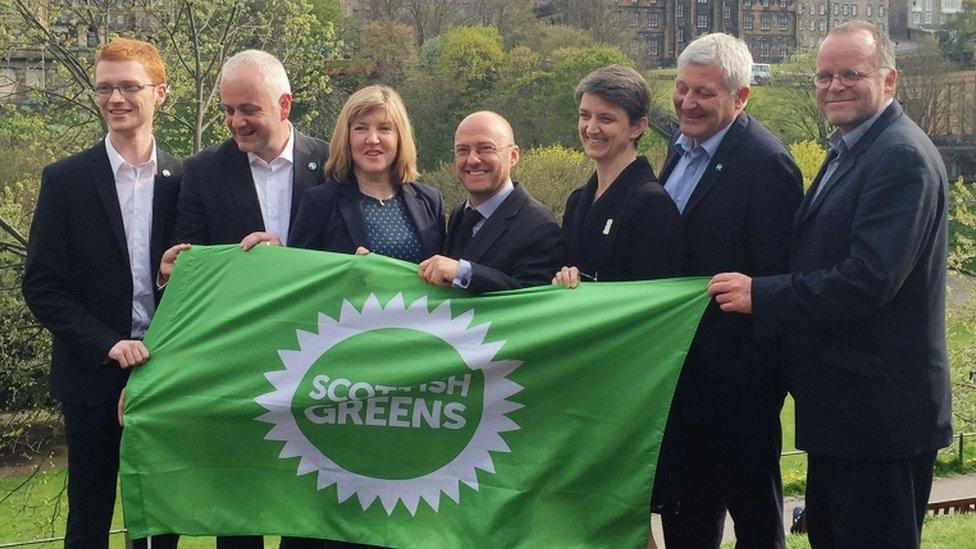
The SNP has already ruled out a Holyrood pact with the Scottish Greens
There will be no pact with the Greens this time - not least because their tax plans differ very sharply from the proposals in the SNP manifesto.
Then we hear talk from the Tories that they will not repeat the 2007/11 parliament either, when they tended to back the SNP budget in return for concessions such as police numbers and town centre redevelopment.
The bold narrative is that they will form a robust opposition. That they will block, that they will thwart, that they will rain Unionist hell down upon the heads of the Nationalist cohort.
Well, maybe. But does that mean they will always vote against the SNP? Really? Say there is a Labour motion - or a Green one - advocating the principle of higher taxation for the future in Scotland. Which way would Tories cast their votes?

Willie Rennie's photocalls provided some light relief during the election campaign
Are they really saying that they will abstain from seeking to win concessions in the budget: concessions which they could later depict as Tory gains? I think not.
And the Liberal Democrats? For now, they are simply delighted to have clung on, to have retained their northern isles redoubts - and to have added two mainland constituencies to the total, plus a further list seat.
They cracked open the champagne to mark this outcome, gently disregarding for the moment the uncomfortable fact that the Greens now have one more seat in Parliament than the Lib Dems.
It takes a degree of chutzpah to brandish the bubbly for coming fifth. But, then, we are talking here about Willie Rennie, the hero who braved the pigs of Gorgie.
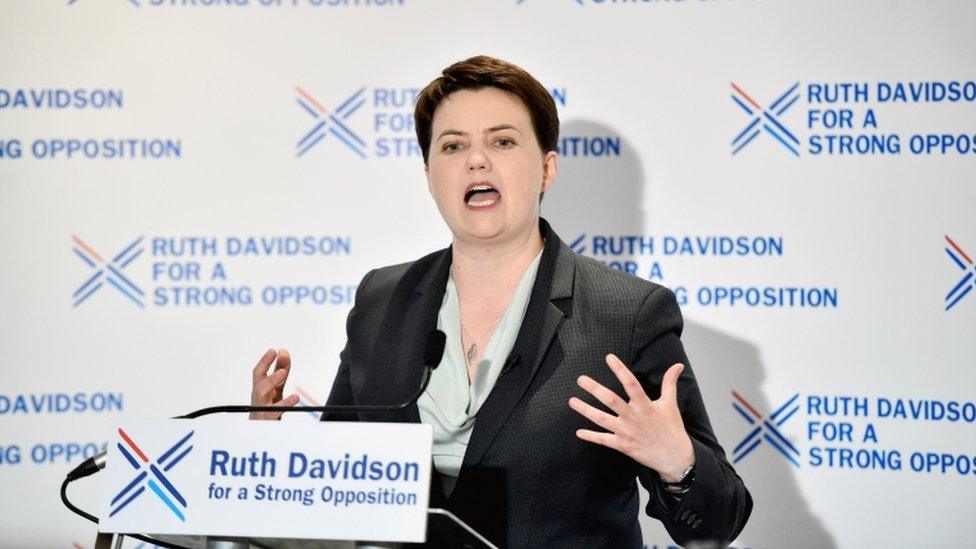
Ruth Davidson has positioned her party as the defenders of the Union
More seriously, all the opposition parties will be judged by performance. Which applies more than ever to the SNP. No comfortable majority. No domination of committees.
Again, one understands why, in the aftermath of a very considerable victory, Nicola Sturgeon should declare that she is entitled to exercise her mandate, to implement her manifesto.
I think, on balance, it will be another aspect of Ms Sturgeon's Bute House post-election statement which will apply. The section when she said she would seek to persuade, rather than divide. She was talking specifically about independence but I feel that sentiment applies to governance more generally. A dose of minority humility seems warranted.
Tactical voting
Is a second independence referendum more or less likely as a result of the election? One might think not, in that there was a notable Conservative advance largely as a consequence of corralling a substantial chunk of the No vote. Those were distinct Unionist gains - and, privately, some SNP strategists say they detected tactical voting against independence in the contest.
Then again, one might think indyref2 is more likely in that there is a conjoined majority for independence when one includes the Greens alongside the SNP. Certainly, a vote to hold such a referendum would get through parliament.
But consider. In practice, nothing has changed. Nicola Sturgeon is no more inclined towards a referendum now than she was during the campaign. And she was not much inclined then.
For the umpteenth time, she does not want to hold a referendum. She wants to win one. She is not interested, with regard to this issue, in the parliamentary arithmetic. She checks out the sums in the country. Would folk say Yes this time around? Until she can be sure - not, I suspect, for quite some time - no referendum.
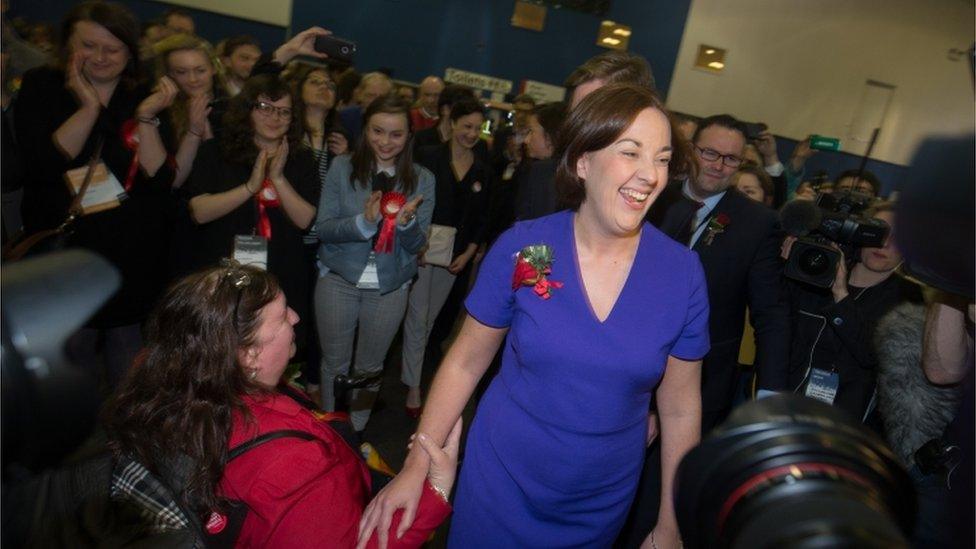
Scottish Labour had another terrible election night - but there does not seem to be much appetite for replacing Kezia Dugdale as leader
Which brings us to Labour. They had an appalling election night, shedding seats and confidence. Self-evidently, there will now be a period of introspection. (Yes, another one. They have become rather frequent of late, although not any more palatable to the party).
There will be discussion of leadership - quite reasonably - although I don't detect any desire for another contest. Just like another struggling outfit I could mention, sooner or later you have to settle upon a boss and give him/her a chance longer than a single season/session.
There will be discussion of tax. Labour continues to insist that its standpoint caught the mood, that it was potentially popular. Snag is folk didn't vote for it. Expect the Left to seek to entrench redistribution, expect the Centre and the Right of the party to argue for a different approach.
And there will be talk of the constitution. Labour, consciously and deliberately, eschewed the issue during the campaign. As this site repeatedly noted, they did so in plain contradistinction to their approach in other elections.
Sidestepped independence
In an interview with me, Alex Rowley, the deputy leader, has said that the party must now find new language to join the discourse. He is uncomfortable, he says, being labelled either Unionist or Nationalist. He argues for Scottish Home Rule within a Federal UK.
Mr Rowley's discomfort is shared by others. They felt uneasy, to put it mildly, forming a cohort to defend the Union alongside the Tories. They were punished by their working-class electorate for that pact.
That is why they sidestepped independence during the election campaign. They did not want to remind voters of their Better Together accommodation with the Tories.
Longer term, it might be the right strategy to get off the constitution as an issue, and onto tax and spending. Longer term.
In the short term, it was catastrophic. It allowed the Tories to posit themselves as the only true Unionists - and to garner anti-SNP votes as a consequence.
Right now, Labour seems glum and discontented - but, curiously, not entirely despondent. They are in there still. Kezia Dugdale says she will offer to lead a "progressive opposition" to the SNP. Presumably on the grounds that she no longer leads the main opposition.